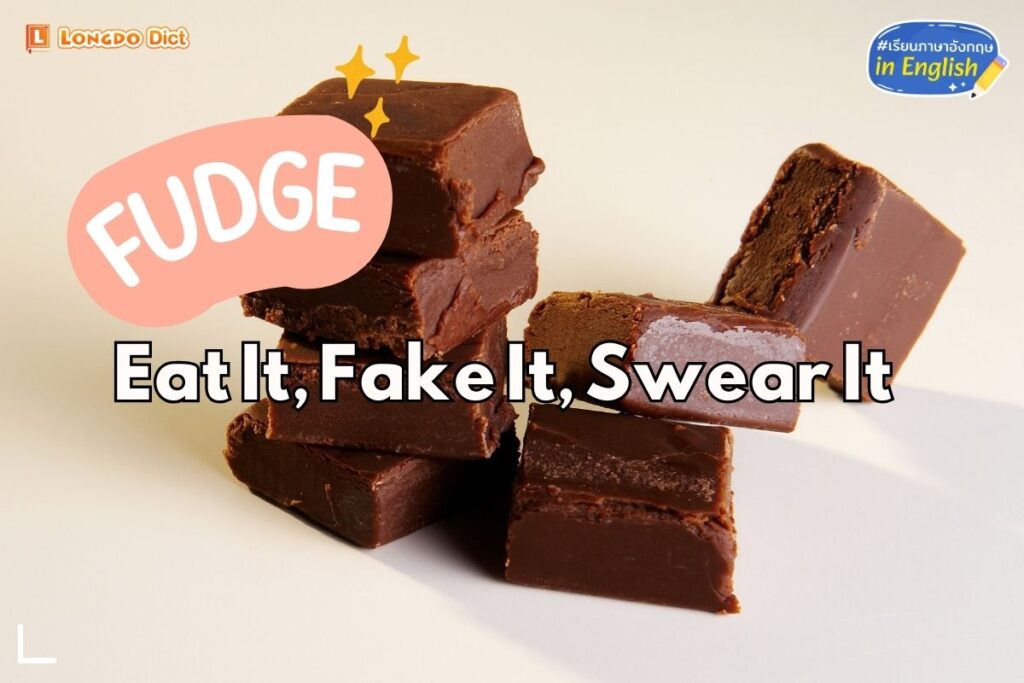“Fudge” พอได้ยินคำนี้แล้วหลายคนต้องนึกถึง Chocolate Fudge กันอยู่แน่ๆ แต่จริงๆ แล้วคำนี้ไม่ได้หมายถึง ขนมเค้ก อย่างเดียวนะ คำนี้ยังมีความหมายอื่นอีกที่หลายๆ คนอาจจะยังไม่รู้ แต่ที่แน่ๆ คือ ความหมายนั้นไม่ได้มีความเกี่ยวข้องอะไรกับของอาหาร หรือ ของหวานเลย ถ้าอยากรู้อีกความหมายของ Fudge มาลองอ่านบทความนี้กันเลยค่ะ ระดับความยาก: 1

Do you love chocolate? Then for sure you know what “fudge” is: a rich dessert that’s somewhere between candy and cake. But did you know that this is not the only meaning of the word? In fact, “fudge” has been in use for centuries and it had nothing to do with food.
How We Got Here
If you’re interested in learning how English has changed over the years, there’s a really cool website called etymonline.com where you can find the “etymology” of words. According to etymonline.com:
- One of the earliest known meanings of “fudge” is to build something in an incorrect way because you don’t have the right parts. An example of this might be if you bought an Ikea table but when you open the box you accidentally break one of the legs; so you use a stick from a tree instead. You might think you’re being clever, but when your husband comes home he isn’t happy. He says, “Your table is ugly and it isn’t strong enough for us to put our dinner on it!”
- Over time the meaning changes. “Fudge” is not just putting something together in a “clumsy” way; it’s put together in a dishonest way. So in this example maybe you bought the Ikea table from a seller on Lazada, but when it arrives it doesn’t look anything like the picture on the website. It’s supposed to be made of wood but in fact it’s all plastic. What you realize is that it’s not really made by Ikea!
- Then the meaning of “fudge” changes again from making something that is not real or correct to any kind of lie. It was something sailors in the 19th Century would say to you if they didn’t believe you: “Lies!” (Today we might say “Bullshit!”)
Back to the 21st Century
Today, you’ll see “fudge” used in 3 main ways.
First, as we already know, there is a specific dessert called fudge, which is softer than a brownie but more solid than pudding. Also some people use it to describe chocolate when it’s a sauce. A “hot fudge sundae,” for example is just vanilla ice cream with warm chocolate sauce on it (and sometimes with whipped cream and nuts).
Fudging the Truth
The second “fudge” that’s most common today is similar to its original meanings, which is “fake” or “to fake” something. Here are some examples:
- Scientists accused of publishing “fudged” results of their research
- An ice cream company that “fudged” its “all-natural” ingredients
- A champion badminton player who “fudged” his age so he could play against younger players
- An tech startup founder “fudged” names and addresses of fake users
What the Fudge
Finally, in English there is a list of words that are considered so impolite that in the past you never heard them on television or in song lyrics or in movies unless the movies were for adults only. One of these words starts with the letters “F” and “U”. This word is often replaced with “fudge” usually to express surprise, anger or to respond to something negative, similar to saying “damn!” or “shit!” (Twenty years ago, you also never heard the word “shit” on TV.)
คำศัพท์ที่น่าสนใจในบทความ
- century (n) ศตวรรษ
- etymology (n) นิรุกติศาสตร์, วิชาที่ว่าด้วยกำเนิดและการพัฒนาของคำ
- clumsy (adj) ซุ่มซ่าม, เซ่อซ่า, ไม่คล่อง, ไม่ชำนาญในการใช้, งุ่มง่าม, เงอะงะ
- bullshit (sl) หลอกลวง, โกหก
![]() มีคำศัพท์คำไหนที่อยากให้อธิบายด้วยภาษาอังกฤษอีกบ้างไหมครับ ส่งเมลมาที่ [email protected] ได้เลยครับ
มีคำศัพท์คำไหนที่อยากให้อธิบายด้วยภาษาอังกฤษอีกบ้างไหมครับ ส่งเมลมาที่ [email protected] ได้เลยครับ
![]()





Comments are closed, but trackbacks and pingbacks are open.